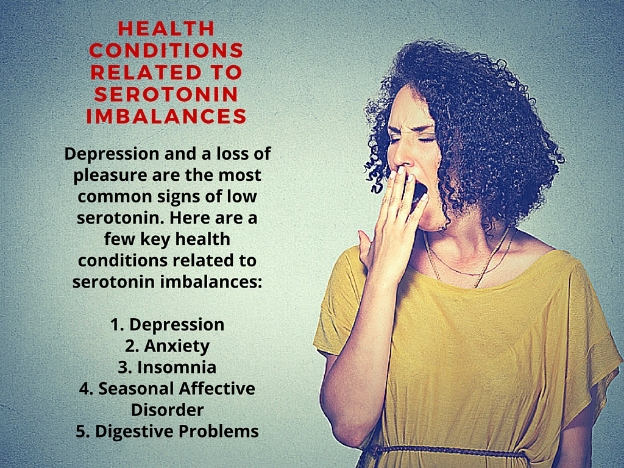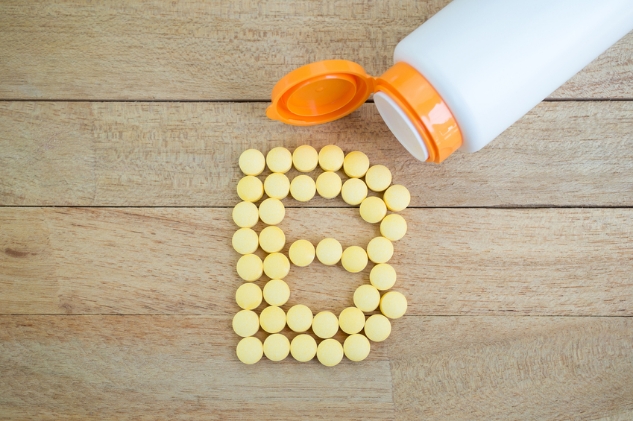 What is serotonin? Serotonin acts as a neurotransmitter to help relay signals from different areas of the brain. Sometimes called the “feel good” neurotransmitter or the “happy molecule,” the level of serotonin in the brain is important for positive moods.
What is serotonin? Serotonin acts as a neurotransmitter to help relay signals from different areas of the brain. Sometimes called the “feel good” neurotransmitter or the “happy molecule,” the level of serotonin in the brain is important for positive moods.
Although serotonin is made in the brain, between 80% and 90% of your serotonin is found in blood platelets and in the digestive tract.
What does serotonin do? Of the approximately 40 million brain cells, most are directly or indirectly influenced by serotonin.
As a result, low serotonin levels are thought to affect sleep, memory and learning, appetite, sexual desire, mood, temperature regulation, and even social behavior.
Serotonin Deficiency Signs and Symptoms
Depression and a loss of pleasure are the most common signs of low serotonin, which is also called low serotonin syndrome. That said, there are there many other low serotonin symptoms:
- Constipation
- Anger
- Unusual sensitivity to pain
- Carbohydrate cravings and binge eating
- Lack of joy
- Panic attacks or excessive worrying
- Low self-esteem
- Violent behavior or suicidal thoughts
- Poor cognitive function, such as an inability to focus or a lack of mental clarity
- Mania or obsession
- Agitation during bad weather
- Fatigue

Conditions Related to Serotonin Deficiency
Low serotonin causes include low dietary levels of L-tryptophan, insufficient exposure to sunlight, vitamin B6 deficiency, stress, lack of sleep, lack of exercise, and childhood abuse. Intake of the amino acid theanine may also cause serotonin deficiency symptoms. Serotonin deficiency is also related to the actions of other neurotransmitters. For instance, low serotonin and dopamine are linked, as well as low norepinephrine, acetylcholine, epinephrine, glutamate, and gamma-aminobutyric acid.
Low levels of serotonin are related to a number of health conditions, including anorexia, obesity, migraines, temporomandibular joint syndrome, obsessive compulsive disorder, dementia, heart disease, Alzheimer’s disease, asthma, autism, tinnitus, or fibromyalgia. Here are a few key health conditions related to serotonin imbalances.
1. Depression
Researchers believe that a lack of serotonin may influence mood, which leads to depression. Serotonin is an important transmitter for mood. Low serotonin depression symptoms include sleep problems, increased anxiety, headaches, feelings of hopelessness, and the avoidance of social situations. The lowest levels of serotonin are frequently observed in people who have attempted or committed suicide. Increasing serotonin levels can help decrease depressive symptoms.
2. Anxiety
In people with low serotonin, anxiety is common. Although it’s not the only neurotransmitter related to anxiety, increasing serotonin levels is thought to be an effective method to decrease anxiety.
3. Insomnia
Serotonin is an important initiator in sleep. If you’re having trouble sleeping, you may have a low serotonin sleep disorder (like insomnia). Supplemental L-tryptophan has shown modest effects in the treatment of insomnia. 5-hydroxytryptophan (5-HTP) is a step closer to serotonin than tryptophan, and several studies have shown that it produces better results than tryptophan in promoting and maintaining sleep.
4. Seasonal Affective Disorder
Seasonal affective disorder (SAD) is another mood disorder where depression and low energy are factors. Many people develop SAD in the darker winter months. The lack of natural sunlight causes a drop in serotonin levels. Researchers have found that serotonin production is directly affected by exposure to bright sunlight.
5. Digestive Problems
Studies have found that serotonin signaling in the gut plays an important role in the development of digestive conditions such as irritable bowel syndrome (IBS). IBS symptoms include diarrhea, constipation, mucus in stools, abdominal pain or cramping, gas, heartburn, fatigue, depression, and insomnia. Increasing serotonin may help improve digestion and IBS.
Low Serotonin Symptoms in Women and Men
It’s interesting that low serotonin symptoms are different in women and men. A study published in the journal Biological Psychiatry in 2007 confirms that there may be a difference in how women and men react to low serotonin. This can help explain why women are twice as likely to experience anxiety, depression, and other mood disorders than men. Women are also more likely to binge-eat, gain weight, and crave carbohydrates. Excessive carb-eating is a self-medicating way to increase serotonin levels. Impulse control disorders, attention deficit-hyperactivity disorder (ADHD), and alcoholism are low serotonin disorders typically found more often in men than women.
Best Foods to Prevent Serotonin Deficiency
It’s a good idea to increase serotonin levels through diet. Although serotonin isn’t found in foods, there are foods high in tryptophan, which is a precursor of serotonin. Foods high in iron, protein, vitamin B2, and vitamin B6 all contain high amounts of tryptophan. This is important since a vitamin B6 deficiency can cause a serotonin deficiency. The protein in eggs can also increase blood levels of tryptophan. Good sources of tryptophan include cod, tuna, chicken, turkey, spinach, grass-fed beef, salmon, tree nuts, avocado, spirulina, brown rice, eggs, pineapple, and soy products.
However, eating foods high in tryptophan isn’t that simple. Tryptophan in food competes with other amino acids that need to be absorbed in the brain. That said, when you mix high-tryptophan foods with carbohydrates, you may see a boost in serotonin levels. Carbohydrates cause the body to release more insulin. This promotes the absorption of amino acids, which leaves tryptophan in the blood.

Good sources of tryptophan include cod, tuna, chicken, turkey, spinach, grass-fed beef, salmon, tree nuts, avocado, spirulina, brown rice, eggs, pineapple, and soy products.
Recommended Daily Amount of Tryptophan
The Institute of Medicine at the National Academy of Sciences established recommended amino acid patterns in 2002. Tryptophan was recommended at 7 milligrams per gram of protein consumed daily. Since 50 grams of protein is recommended per day, 350 milligrams of tryptophan would represent the daily recommendation of tryptophan each day. An alternative recommendation is based on milligrams of tryptophan consumed per kilogram of body weight. The World Health Organization suggests:
- Infants up to two years of age: 17 mg/kg
- Children two to 10 years old: 12.5 mg/kg
- Children and teens 10 to 18 years old: 3.3 mg/kg
- Adults over 18 years old: 3.5 mg/kg
Natural Treatments for Low Serotonin
Selective serotonin reuptake inhibitors (SSRIs) are common drugs used to treat anxiety, depression, and other mood disorders. However, SSRIs don’t work in up to 40% of people who use them. This may be because the brain isn’t producing enough serotonin, or that there are too few serotonin receptors in the brain. Dopamine deficiency may also be the underlying cause of the mood disorder.
There are also natural supplements that can improve serotonin function.
1. 5-HTP
The tryptophan in food does not compete with the supplement 5-HTP. It’s used for various conditions related to low serotonin, including headaches, fibromyalgia, obesity, ADHD, anxiety, depression, and sleep disorders such as insomnia. 5-HTP works in the central nervous system and brain by increasing serotonin production.
2. B-Complex Vitamins
Since people with vitamin B6 deficiency often have low serotonin levels, it’s a good idea to supplement with B complex vitamins. B vitamins such as folic acid, vitamin B6, and vitamin B12 are involved in neurotransmitter metabolism. B vitamins help combat the effects of stress, and balance brain chemicals such as serotonin. Vitamin B6 in particular supports serotonin production in the brain, and it’s required for proper metabolism of 5-HTP.
3. SAM-e
S-adenosylmethionine (SAMe) is a natural supplement that increases the concentration of brain neurotransmitters responsible for mood. As a result, SAMe is used for conditions related to serotonin deficiency such as anxiety, depression, fibromyalgia, heart disease, dementia, Alzheimer’s disease, ADHD, and migraines.
4. Omega-3 Fatty Acids
Omega-3 fatty acids are thought to have a direct effect on serotonin levels. Studies have suggested that insufficient omega-3s may lead to low serotonin levels. Increasing omega-3 levels may make it easier for serotonin to pass through cell membranes. Omega-3 fatty acid supplements such as fish oil and flaxseed oil can help low serotonin-related conditions such as heart disease, ADHD, bipolar disorder, asthma, and depression.
5. Rhodiola Rosea
Rhodiola rosea is an herb that slows the enzymatic breakdown of serotonin and other neurotransmitters, including dopamine. The herb is also used for conditions associated with low serotonin such as fatigue, stress, depression, anxiety, insomnia, and headaches. The phytochemicals in R. rosea function like monoamine oxidase inhibitors. In other words, these phytochemicals inhibit an enzyme that is responsible for the breakdown of serotonin. In turn, this leads to greater concentrations of serotonin in the brain.
Other Supplements
L-theanine is an amino acid with a calming effect which is helpful for anxiety disorders, a condition related with low serotonin levels. Some people have had success in boosting serotonin levels by incorporating the supplement inositol into their diets. If you’re low in magnesium, serotonin is likely low as well, in which case it’s best to increase your intake of magnesium through dark green leafy vegetables.

Since people with vitamin B6 deficiency often have low serotonin levels, it’s a good idea to supplement with B complex vitamins.
How Can You Prevent Serotonin Deficiency?
There are also various ways to boost serotonin levels apart from diet or supplements. Here are some you can try.
-
Sleep:
Sleeping helps the body manufacture key neurotransmitters such as serotonin. If you’re not getting enough sleep, you may experience serotonin deficiency symptoms, which includes insomnia. It’s a good idea to avoid caffeine, alcohol, and stressful activities before bed to help improve the quality of your sleep.
-
Exercise:
Physical exercise can increase serotonin levels. Exercise can be more effective than antidepressants, and may increase serotonin levels and improve serotonin synthesis.
-
Meditation:
Meditation can help people overcome depression and anxiety. Various meditation techniques have been found to increase the concentration of serotonin.
-
Relaxation:
It’s wise to have some time to relax and unwind in order to raise serotonin levels. Besides meditation, relaxation activities include deep breathing, reading, or self-hypnosis.
-
Sunlight:
Getting sufficient sunlight is another way to increase serotonin. Bright light therapy is a treatment used for people with SAD. Natural sunlight outside can boost serotonin and vitamin D levels.
Overcoming Low Serotonin Deficiency: The Bottom Line
There are many conditions and symptoms linked with low serotonin, and if this is affecting you, it’s a good idea to make lifestyle changes that naturally increase your serotonin. Here is a summary of what helps increase serotonin in the body:
- Combine high-tryptophan foods with carbohydrates.
- Use supplements such as 5-HTP, B complex vitamins, SAM-e, omega-3 fatty acids, and Rhodiola rosea.
- Make other lifestyle changes such as getting proper sleep, getting regular exercise, increasing sunlight exposure, and learning to relax through meditation or deep-breathing exercises.
Read Next:
